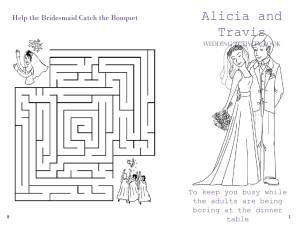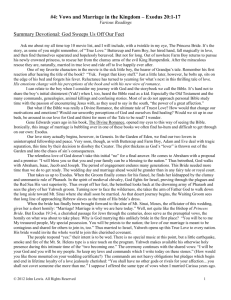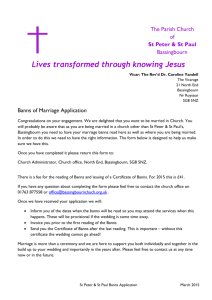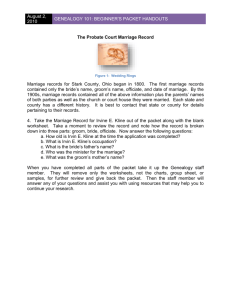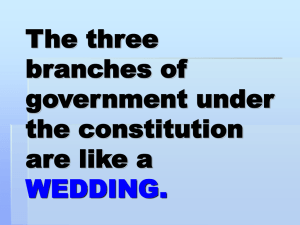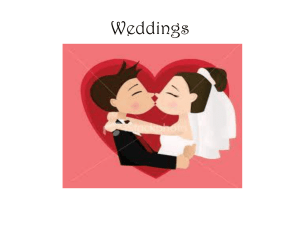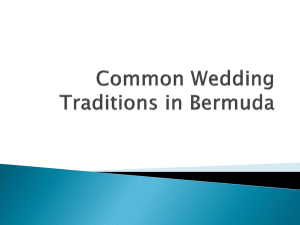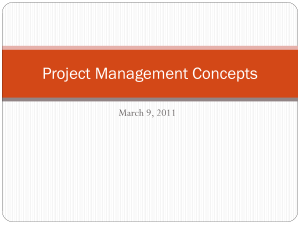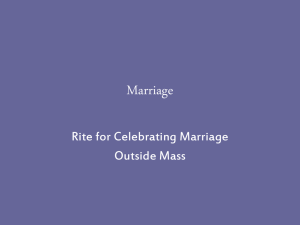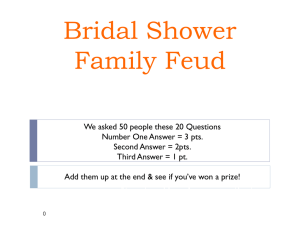N - St Anne`s Church Baslow
advertisement
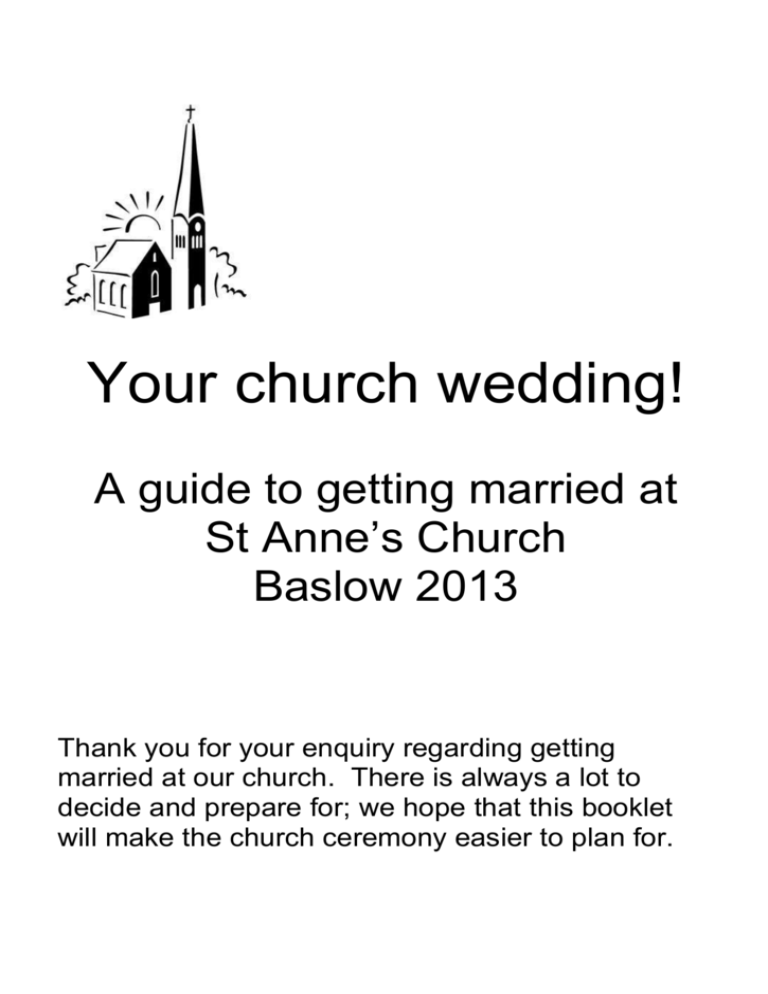
Your church wedding! A guide to getting married at St Anne’s Church Baslow 2013 Thank you for your enquiry regarding getting married at our church. There is always a lot to decide and prepare for; we hope that this booklet will make the church ceremony easier to plan for. This booklet contains: the legal requirements for getting married in a Church of England building, the basic service contents, suggestions for hymns and Bible readings, ideas for music as the Bride comes into the church and as the couple leave at the end of the service, things to note particular to the church and its location, a list of the fees charged. If you have any questions, or to make a firm booking at St Anne’s Baslow please get in touch with Gillian Armitt, United Benefice Administrator e: admin@eyamchurch.org t: 01433 630930 God bless. Rev’d Mike Gilbert (Vicar) 07947 092951 2 Who can get married in a Church of England church? Everyone in England lives in a parish and belongs to a parish church. That’s the church you should initially contact for more information about getting married. However, from October 1st 2008 you may marry in a church that has special significance for you as well as your parish church. An example might be the parish where one of you grew up in or where a parent of one of you lives. See pages 4-5 for more information. If you qualify to get married at St Anne’s Church, Baslow, the usual process is to have your Banns (a public declaration that you intend to be married) read out in church. You would be most welcome to join the church community for the service and to hear them read. Banns are an announcement of your intention to marry and a chance for anyone to put forward a reason why the marriage may not lawfully take place. Banns also need to be read in the parish where each of you lives as well as the church in which you are to be married if that is another parish, so you need to contact the vicar of your local church to arrange this. You must have your banns read out in church for three Sundays during the three months before the wedding. This is often done over three consecutive Sundays. What if one of us is divorced? There are special guidelines on church marriage if you have been divorced. The Church of England believes that marriage is for life. But it recognises that sadly, some marriages do fail. In exceptional circumstances, the Church accepts that a divorced person may marry again. Speak to your Vicar – they will want to talk to you frankly about your past and your hopes for the future. Even if it is not possible to do your wedding, they may be willing to offer you service of prayer and dedication after a civil ceremony. 3 Legal requirements for a Church of England wedding There are a number of reasons for choosing a particular church building in which to get married. Each comes with legal requirements. Couples usually wish to marry in a church local to where they live, or where they are regular members attending worship. If one or both is resident in the parish, or one or both is a regular worshipper (for at least 6 months at that church) then the Banns are read (within 3 months of the date of the wedding) at the church where the wedding is to take place, and at any other church in which either the bride or groom is also a resident in that parish. Sometimes the church of choice is one that has special significance for a couple, even if they don’t live there or are not worshippers there. Couples would need to demonstrate a straightforward ‘Qualifying Connection’ with the church to enable Banns to be read and the marriage to legally take place. These legal ‘Qualifying Connections’ are: either the bride or groom: was baptised in the parish; or had their confirmation entered in a church register book of a church or chapel in the parish; or has at any time had their usual place of residence in the parish for at least 6 months; or has at any time habitually attended public worship in the parish for at least 6 months; or, a parent of either the bride or groom (within the lifetime of the bride or groom): had their usual place of residence in the parish for at least 6 months; or habitually attended public worship in the parish for at least 6 months; or a parent or grandparent of either the bride or groom was married in that church. 4 So are we able to get married at the church of our choice? Yes, by having your Banns read, if: one or both of you are resident on the parish, or one or both of you are regular worshippers at the church, or one or both of you can demonstrate a legal ‘Qualifying Connection’ None of those apply to me – can I still get married at your church? If you do not have a residence in the parish, are not a regular worshipper at the church, and you cannot demonstrate a legal qualifying connection with the church of your choice, then in order for you to qualify to have your wedding there you must attend worship regularly (once a month minimum) for at least 6 months before you book the wedding. Once you have attended for 6 months you may fill in a form which puts you on the list of church members (the Church Electoral Roll) and this membership qualifies you to be married at that church. I don’t have any ‘qualifying connections’ and live too far away to be able to attend worship regularly, if at all. What happens next? If you are not able to satisfy any of the legal requirements (residency, a qualifying connection, or regular attendance in order to go on the Electoral Roll) it will be not be possible for you to marry at the church of your choice. In this case the vicar here will help you to look for a church where you could get married, and help with any arrangements. 5 What is included in the basic wedding service? Welcome The vicar will welcome the congregation. Your family and friends have an important role to play as witnesses and supporters of your marriage. Entrance of the Bride Traditionally, the bride and groom enter the church separately - the groom with the best man before the service begins, and the bride at the time set for the start of the service, on the arm of her father or another relative or friend (it does not need to be a man). However, the bride may enter alone if she wishes, or the couple may enter together. Hymns & Music – see pages 11 and 15 for ideas The Preface – see pages 8 & 9 The vicar will read an introduction explaining what Christians believe about marriage. They will also ask, as the law requires, if anyone knows any reason why the marriage may not lawfully take place. The Declarations – see page 10 You will be asked to promise before God, your friends and your families, that you will love, comfort, honour and protect your partner and be faithful to them as long as you both shall live. The vicar will also ask the congregation to declare that they will support and uphold your marriage. Bible Reading and other readings/poetry – see page 12 It is usual to have one or more readings (one of which must be from the Bible) and the vicar will give a talk. You may like to ask a friend or family member to participate in your wedding by doing these readings The Marriage Vows – see page 13 Turning to each other, the bride and groom take each other’s right hand and make vows. The couple then exchange a ring or rings as a 'sign of their marriage' and a reminder of the vows. The vicar will then declare that you are now husband and wife! 6 Registration of the Marriage After you have exchanged your vows, the bride, groom and two witnesses must sign the register. This is a legal requirement and the vicar will give you a copy of the marriage certificate. Prayers, including Lord’s Prayer – see page 14 In the prayers God’s blessing and help is asked for you. There may be a prayer for the gift of children, but every couple will have their own feelings about this, so it's best to discuss the details with the vicar. You may wish to help choose the prayers or to write your own. Blessing The marriage is blessed after the vows made by the couple and the declaration of marriage made by the vicar. The service ends with words of blessing for everyone. 7 What is ‘The Preface’? This is an introduction to the service, setting out the Christian context for marriage and reminding everyone of the duties and joys of being married. You have a choice of 2 Prefaces: A or B PREFACE A In the presence of God, Father, Son and Holy Spirit, we have come together to witness the marriage of N and N, to pray for God’s blessing on them, to share their joy and to celebrate their love. Marriage is a gift of God in creation through which husband and wife may know the grace of God. It is given that as man and woman grow together in love and trust, they shall be united with one another in heart, body and mind, as Christ is united with his bride, the Church. The gift of marriage brings husband and wife together in the delight and tenderness of sexual union and joyful commitment to the end of their lives. It is given as the foundation of family life in which children are [born and] nurtured and in which each member of the family, in good times and in bad, may find strength, companionship and comfort, and grow to maturity in love. Marriage is a way of life made holy by God, and blessed by the presence of our Lord Jesus Christ with those celebrating a wedding at Cana in Galilee. Marriage is a sign of unity and loyalty which all should uphold and honour. It enriches society and strengthens community. No one should enter into it lightly or selfishly but reverently and responsibly in the sight of almighty God. N and N are now to enter this way of life. They will each give their consent to the other and make solemn vows, and in token of this they will [each] give and receive a ring. We pray with them that the Holy Spirit will guide and strengthen them, that they may fulfil God’s purposes for the whole of their earthly life together. 8 PREFACE B We have come together in the presence of God, to witness the marriage of N and N, to ask his blessing on them, and to share in their joy. Our Lord Jesus Christ was himself a guest at a wedding in Cana of Galilee, and through his Spirit he is with us now. The Bible teaches us that marriage is a gift of God in creation and a means of his grace, a holy mystery in which man and woman become one flesh. It is God’s purpose that, as husband and wife give themselves to each other in love throughout their lives, they shall be united in that love as Christ is united with his Church. Marriage is given, that husband and wife may comfort and help each other, living faithfully together in need and in plenty, in sorrow and in joy. It is given, that with delight and tenderness they may know each other in love, and, through the joy of their bodily union, may strengthen the union of their hearts and lives. It is given as the foundation of family life in which children may be born and nurtured in accordance with God’s will, to his praise and glory. In marriage husband and wife belong to one another, and they begin a new life together in the community. It is a way of life that all should honour; and it must not be undertaken carelessly, lightly, or selfishly, but reverently, responsibly, and after serious thought. This is the way of life, created and hallowed by God, that N and N are now to begin. They will each give their consent to the other; they will join hands and exchange solemn vows, and in token of this they will [each] give and receive a ring. Therefore, on this their wedding day we pray with them, that, strengthened and guided by God, they may fulfil his purpose for the whole of their earthly life together. 9 The Declarations The minister says to the congregation “First, I am required to ask anyone present who knows a reason why these persons may not lawfully marry, to declare it now.” The minister says to the couple “The vows you are about to take are to be made in the presence of God, who is judge of all and knows all the secrets of our hearts; therefore if either of you knows a reason why you may not lawfully marry, you must declare it now.” The minister says to the bridegroom “N, will you take N to be your wife? Will you love her, comfort her, honour and protect her, and, forsaking all others, be faithful to her as long as you both shall live?” He answers I will. The minister says to the bride “N, will you take N to be your husband? Will you love him, comfort him, honour and protect him, and, forsaking all others, be faithful to him as long as you both shall live?” She answers I will. The minister says to the congregation “Will you, the families and friends of N and N, support and uphold them in their marriage now and in the years to come?” They answer We will. 10 What about hymns during the service? There are usually two or three hymns during a wedding service. Try to find hymns that are familiar to those who will be present - and are easy to sing! The following are popular choices: All things bright and beautiful Come down O love divine Father hear the prayer we offer Give me joy in my heart Love divine, all loves excelling Lead us, heavenly Father, lead us Lord of all hopefulness Make me a channel of your peace Morning has broken One more step along the world I go O, praise ye the Lord Now thank we all our God Praise my soul, the king of heaven The king of love my shepherd is We can arrange an organist for you, or you may have a friend who is an organist, so why not see if they would like to play for your wedding! 11 I don’t know what to choose from the Bible? There are many popular and exciting readings. Read some of these together and see if what they say seems important to you. God creates women and men to look after the earth (Genesis, Chapter 1, verses 26-28) A love poem between two lovers (Song of Solomon, Chapter 2, verses 10-13; Chapter 8, verses 6&7) Jesus teaches how to live life that brings true happiness (Matthew, Chapter 5, verses 1-10) Jesus teaches about marriage, and welcomes children (Mark, Chapter 10, verses 6-9 and 13-16 What happens when Jesus attends a wedding reception (John, Chapter 2, verses 1 - 11) Love, actually! (1 Corinthians Chapter 13) Committing to each other (Ephesians Chapter 5, verses 21-33) Seeing the good side… (Philippians Chapter 4, verses 4 - 9) Getting the perfect relationship (Colossians Chapter 3, verses 12 - 17) Being a good lover! (1 John Chapter 4 verses 7 - 12) Readings are available to view online at www.biblegateway.com. Your vicar will be pleased to help you choose the right readings for your wedding service. As well as other Bible readings, they may be happy for you to include a suitable non-religious reading. Choices have been as diverse as 'Winnie the Pooh' and 'Captain Corelli'! www.weddings.co.uk/info This gives ideas for some Biblical and other readings for your wedding. 12 The Vows you will make, and the giving of rings. The vicar will lead you in saying the vows: “I, N, take you, N, to be my wife/husband, to have and to hold from this day forward; for better, for worse, for richer, for poorer, in sickness and in health, to love and to cherish, till death us do part; according to God’s holy law. In the presence of God I make this vow.” The Giving of Rings The vicar will lead you in making promises over your wedding rings: N, I give you this ring as a sign of our marriage. With my body I honour you, all that I am I give to you, and all that I have I share with you, within the love of God, Father, Son and Holy Spirit. You don’t need to learn these or memorise them! The vicar will say them one line at a time, and you repeat what you have heard. 13 Which prayers are used in the service? The vicar may use the following prayers: Faithful God, holy and eternal, source of life and spring of love, we thank and praise you for bringing N and N to this day, and we pray for them. Lord of life and love: hear our prayer. May their marriage be life-giving and life-long, enriched by your presence and strengthened by your grace; may they bring comfort and confidence to each other in faithfulness and trust. Lord of life and love: hear our prayer. May the hospitality of their home bring refreshment and joy to all around them; may their love overflow to neighbours in need and embrace those in distress. Lord of life and love: hear our prayer. May they discern in your word order and purpose for their lives; and may the power of your Holy Spirit lead them in truth and defend them in adversity. Lord of life and love: hear our prayer. May they nurture their family with devotion, see their children grow in body, mind and spirit and come at last to the end of their lives with hearts content and in joyful anticipation of heaven. Lord of life and love: hear our prayer. Let us pray with confidence as our Saviour taught us: Our Father, who art in heaven, hallowed be thy name; thy kingdom come; thy will be done; on earth as it is in heaven. Give us this day our daily bread. And forgive us our trespasses, as we forgive those who trespass against us. And lead us not into temptation; but deliver us from evil. For thine is the kingdom, the power and the glory, for ever and ever. Amen. 14 Can we choose music for the start and end of the service? Many couples choose the traditional "Bridal March" from Lohengrin by Wagner and "Wedding March" by Mendelssohn. However, there is other music that can be chosen, so if you want something different, talk to the vicar or the organist about this. They will advise on what will sound good on the instrument in church. You may also have recorded music on CD which we can play in church; please give us copies of this before the wedding. Web sites There are a number of wedding websites with suggestions for music and readings that you could choose: www.2-in-2-1.co.uk if you go to the 'Wedding Centre' section of their site you will find lots of suggestions about hymns. www.confetti.co.uk This site includes the words and music of the more popular wedding hymns as well as suggestions for readings. www.weddingguide.co.uk The Information and Advice section has suggestions for readings and music including clips of the more popular processional music to help you make your choice. Are there other chances for music? Yes, during the Registration of the Marriage – After you have exchanged your vows, you, the vicar and two witnesses must sign the register. This is a legal requirement. During this time a friend, family member or the choir can perform some music, or you could use a CD player. Talk with your vicar about possibilities. 15 Conditions of the use of St Anne’s Church (at June 2013) Confetti is allowed. Please remind your guests that they should throw it away from the church door. We would prefer the use of biodegradable confetti Car Parking outside the church is restricted! We can only reserve parking within the church grounds for 3 wedding cars. Guests can be dropped off outside the church and the car parked elsewhere. There is disabled parking in the church grounds next to the church rooms to the left of the church. Photography and Video recording by a professional is only permitted inside the church with the approval and under the guidance of the minister taking the service. There will be a small charge for any video recording as we are subject to licensing laws. Flowers: If you wish your own florist to decorate the church you must contact Angela Swindells on 01246 582257 to discuss arrangements. Angela will be able to let you know about access to water and containers etc. If you would like to decorate pew ends with flowers or other decorations you must not use pins or glue of any kind. Pew end decorations should be removed before the next church service, however other floral decorations may be left in the church as agreed with Angela Swindells or the Churchwarden/verger on duty that day. 16 What are the fees? from January 2013 St Anne’s Church, Baslow *BANNS CERTIFICATE OF BANNS *SERVICE VERGER *MARRIAGE CERTIFICATE ORGAN BELLS YOUR TOTAL 21.00 11.00 381.00 35.00 4.00 70.00 120.00 £642.00 FOR WEDDINGS HELD ELSEWHERE: BANNS ADDITIONAL MARRIAGE CERTIFICATES 34.00 10.00 A (non-refundable) deposit of £100 is to be paid at the time of booking the wedding, cheque payable to ‘St Anne’s, Baslow Parochial Church Council’ This will come off the final balance. Fees are to be paid in full 2 weeks before the date of the wedding. Add up your total amount (basic fee of £452.00 plus all extras). Cheques are payable to ‘St Anne’s, Baslow Parochial Church Council’ for the balance Please send all correspondence to: The Benefice Administrator, The Church Centre, Church Street, Eyam, Hope Valley S32 5QH *Statutory fees laid down by the Church Commissioners in London. All other fees are set locally by the Parochial Church Council 17 APPLICATION TO MARRY AT ST ANNE’S CHURCH, BASLOW Names and addresses of applicants: Telephone and email of applicants: Your connection with St Anne’s Church if any: Possible dates for your wedding: You will be invited to see the Rector and when you attend please could you each bring photographic proof of identity eg passport or photographic driving licence, and proof of residence eg council tax bill. If either of you have been married previously, please can you bring the decree absolute. 18
